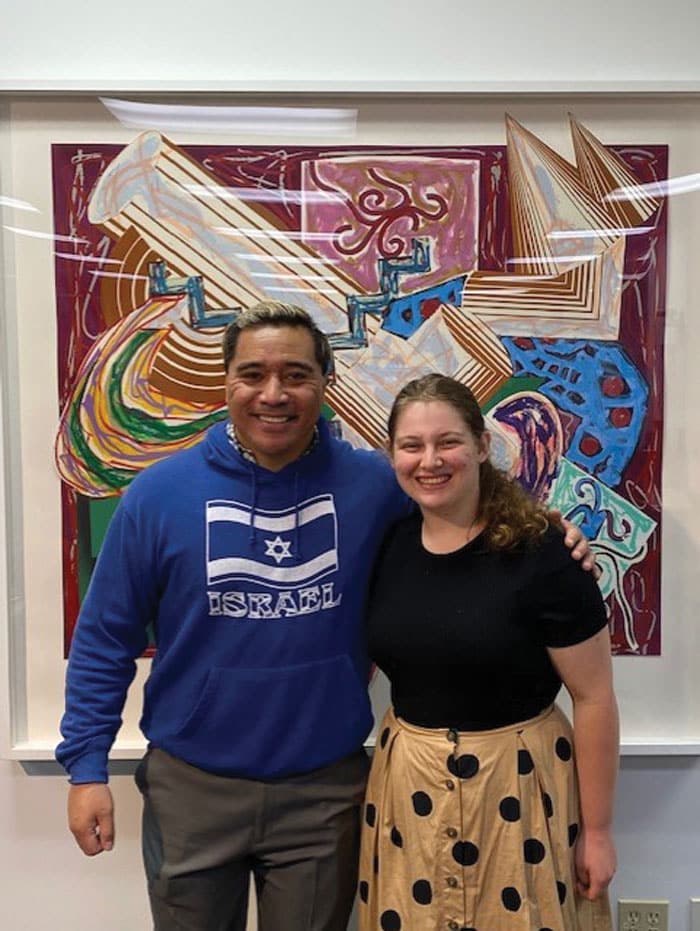 DutcherAerials/Getty Images
DutcherAerials/Getty Images The 50-year partnership between Hebrew Union College-Jewish Institute of Religion (HUC-JIR) and the University of Southern California (USC) has been renewed for the next 25 years.
“This partnership models our shared values of diversity and inclusion through the participation of students of all faiths and backgrounds and helps build a strong foundation of mutual understanding and respect among future leaders of society,” HUC-JIR President Andrew Rehfeld said. “The renewal of our partnership for another 25 years is an historic step forward for both our institutions.”
On September 12, USC President Carol Folt and Rehfeld commemorated the partnership at a gathering of these institutions’ Trustees, Governors, alumni, supporters, community partners, faculty, administrators and students.

“It is an honor to celebrate the great vision that led to this partnership, the work of so many who have contributed to it over the years, our shared history and our continued responsibility to educate future generations in Jewish studies and to build a better and more just future,” Folt said. More than 650 USC students of all faiths and backgrounds participate each year; more than 50 HUC faculty and more than 20,000 USC students have taken part over the years.
HUC-JIR-taught courses include Hebrew language, Jewish history, the Holocaust, Israeli society and literature and religious studies. Founded in 1875, HUC-JIR is North America’s leading institution of higher Jewish education and the academic, spiritual and professional leadership development center of Reform Judaism.
“From the student perspective, the collaboration is seamless,” Dr. Leah Hochman, director of the Louchheim School for Judaic Studies, told the Journal.
USC students take Jewish studies classes at USC, receive USC credit and earn USC course requirements.
“That level of integration is a real blessing that developed out of the longevity of the arrangement between the schools,” she said. ”From the faculty perspective, it’s a complete blast to teach both in a secular institution of higher learning and a seminary focusing on training clergy, educators and non-profit managers. No two conversations ever repeat.”
Hochman looks forward to bringing people from each institution who do not yet know each other together.
“There is such a wealth and depth of knowledge and curiosity at each place; I think the collaborations — in terms of classes, projects, community-wide programming, trainings and more — are exciting to anticipate,” she said.
When asked what he was most excited about collaborating on, Dr. Joshua Holo, dean of HUC-JIR’s Jack H. Skirball Campus in Los Angeles, said that there were too many to list, but specified “Stronger than Hate at USC” of the Shoah Foundation, the Casden Research Seminars and their numerous degree programs.
“Overall, I’m most excited about the combined collaborations that leverage the remarkable power of all our various units.” – Dr. Joshua Holo
“Overall, I’m most excited about the combined collaborations that leverage the remarkable power of all our various units,” Holo told the Journal. “We just produced a joint event with USC Hillel and the Casden Institute for the Study of the Jewish Role in American Life, in which we heard a riveting lecture from the great-grandson of Eliezer ben Yehuda, the man credited with reviving the Hebrew language around the turn of the 20th century.”
The audience of more than 100 people included graduate and undergraduate students, faculty and visitors from HUC, USC and beyond.
“HUC’s relationship with USC represents one of the richest, longest-standing and most productive institutional relationships of its kind, in which we feel tremendous pride,” Holo said. “It represents a complementarity of academic strengths for our students, neighborly opportunities for shared programming and constant enrichment for our combined faculties in Jewish Studies and allied fields. I’d be hard pressed to imagine a more gratifying academic and institutional relationship.”
The HUC-USC relationship provides academic engagement for both institutions, the sharing of faculty expertise and research partnerships across disciplines, and enriched educational opportunities for undergraduate and graduate students.
“Fundamentally, our partnership works so well, because we each bring distinctive gifts to a common goal, that is, excellent higher education,” Holo said. “Our complementary faculty live in a world of shared ideas and commitments, not only teaching with a view toward rigor and enrichment, but also exchanging ideas amongst ourselves for the development of our own research, which spans Jewish languages, history, literature and sociology and more.”
Institutionally, the leadership of HUC and USC have sustained close relationships, generation after generation, he said. Thus, embedding their shared purpose.
“The history of the partnership is fascinating and it is intertwined with the development of that part of Los Angeles,” Hochman said. “Continuing the partnership underscores the creative energy at both institutions as they each support Jewish studies on campus and the students who engage in it.”























 More news and opinions than at a Shabbat dinner, right in your inbox.
More news and opinions than at a Shabbat dinner, right in your inbox.